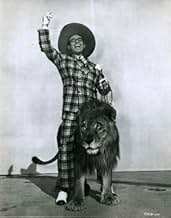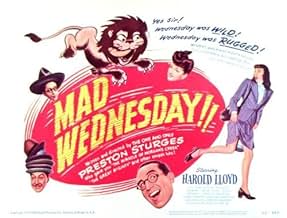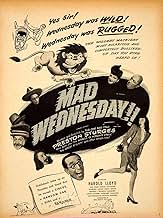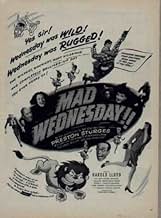IMDb RATING
6.3/10
1.8K
YOUR RATING
Harold is a mild-mannered clerk who dreams about marrying the girl at the desk down the aisle. But then he loses his job, and when he is offered a potent drink at a bar, he goes on a very st... Read allHarold is a mild-mannered clerk who dreams about marrying the girl at the desk down the aisle. But then he loses his job, and when he is offered a potent drink at a bar, he goes on a very strange and funny rampage (with a lion in tow).Harold is a mild-mannered clerk who dreams about marrying the girl at the desk down the aisle. But then he loses his job, and when he is offered a potent drink at a bar, he goes on a very strange and funny rampage (with a lion in tow).
- Awards
- 2 nominations total
- Director
- Writer
- All cast & crew
- Production, box office & more at IMDbPro
Featured reviews
A strange film. Written and directed by the brilliant filmmaker Preston Sturges, and starring silent film comedian Harold Lloyd (about 20 years after his prime), this movie tells the story of a college football hero who settles into a rut as he reaches middle age. Suddenly fired from his dead-end job, the milquetoasty Mr. Diddlebock uses his severance money to break out of his rut, embark on a series of adventures over a wild two or three days alongside a chance acquaintance, the aptly named Wormy (played by Sturges regular Jimmy Conlin), and pursue the woman of his dreams.
Even though this film lacks some of the subtlety, sophistication and polish of some of Preston Sturges' earlier work, it nevertheless (in true Sturges fashion) hides away some pretty heady ideas about growing old, taking chances, and living life to the fullest. this film, a minor entry in the Sturges catalog, would have been the crowning achievement in the career of anyone else. Watch this one, if only to find out what Harold really did on Wednesday!
Even though this film lacks some of the subtlety, sophistication and polish of some of Preston Sturges' earlier work, it nevertheless (in true Sturges fashion) hides away some pretty heady ideas about growing old, taking chances, and living life to the fullest. this film, a minor entry in the Sturges catalog, would have been the crowning achievement in the career of anyone else. Watch this one, if only to find out what Harold really did on Wednesday!
This film drags in some parts, and Lloyd I think puts off some modern viewers. The first time I watched it I thought it was the film equivalent of seeing Ali vs. Andre the Giant. But Sturges' brilliance is in here, and the degree to which it is derived from Lloyd is paid homage to in a wonderful, dark, surreal way. How can you not love a film that starts with the last moments of Lloyd's The Freshman and then shows the hero turned into a mail room stooge who gets buried by the corporate system? The ending is wonderfully hypnotic, happy? Well as is always the case, the poor down trodden guy figures out how to operate the machine just enough to produce his own deus ex machina. Sturges and Lloyd look more brilliant and visionary than ever from the vantage point of post-Enron, MCI, etc.
Calling this film brilliant isn't strong enough. The Dylan lyric "to laugh and cry in a single sound" fits because at the end of the film if your heartstrings are not being strummed then you may not be living.
Lloyd is an everyman squashed by life who encounters a bartender and asks for his first drink, ever. The bartender rises to the challenge and... well, Lloyd spends part of the film piecing together what he did after consuming it... I'm telling you, this film is BRILLIANT. The way it's shot, the acting, the brilliant casting, the writing all work together in a way that has no equal in cinema; the silent version of "The Thief of Baghdad" comes to mind for its sense of unbridled fun and its soaring spirit. This is so much more than a comedy, at some point the movie glides past that label and really grabs the brass ring, you know what I mean?
Truly brilliant, highest possible recommendation.
Lloyd is an everyman squashed by life who encounters a bartender and asks for his first drink, ever. The bartender rises to the challenge and... well, Lloyd spends part of the film piecing together what he did after consuming it... I'm telling you, this film is BRILLIANT. The way it's shot, the acting, the brilliant casting, the writing all work together in a way that has no equal in cinema; the silent version of "The Thief of Baghdad" comes to mind for its sense of unbridled fun and its soaring spirit. This is so much more than a comedy, at some point the movie glides past that label and really grabs the brass ring, you know what I mean?
Truly brilliant, highest possible recommendation.
An interesting if ultimately unsuccessful combination of two clashing comedy styles (overseen by humorless mogul Howard Hughes no less), this film turned out to be Harold Lloyd's swan-song - and, as such, it ended on a somewhat positive note (even though the film was made during Sturges' period of decline).
It opens with a reprise of the climactic football game from one of Lloyd's greatest successes, THE FRESHMAN (1925), eventually bringing that same character (albeit renamed!) up to date. Still, in the end, the film is more Sturges than Lloyd: even if the star plays one of his trademark roles of a patsy (though not without the occasional display of ingenuity), there is little of the star's characteristic slapstick here. Instead, the comedy is in Sturges' typical frantic (and, mainly, dialogue-driven) style - with which Lloyd isn't entirely comfortable; the film also features Sturges' stock company of character players in full swing. That said, it's climaxed by yet another of the star comedian's thrilling set-pieces which finds him overhanging from a building-ledge - hampered this time around by a myopic Jimmy Conlin and an understandably disgruntled circus lion!
While a disappointing whole (it was re-issued in 1950 in a shortened version renamed MAD Wednesday), the film does contain a number of undeniable gems: his romantic attachment to every female member of one particular family (all of whom happen to work for the same firm over a 20-year period); his first encounter with Conlin, with the two of them exchanging wise sayings (the optimistic Lloyd had kept a handful nailed to the wall behind him at his former workplace) in order to explain their current dejected state-of-mind; and, best of all, the unforgettable scene in which Lloyd takes his first alcoholic beverage (an impromptu concoction by bartender Edgar Kennedy and which he names "The Diddlebock") that invariably provokes an unexpected yet hilarious reaction.
It opens with a reprise of the climactic football game from one of Lloyd's greatest successes, THE FRESHMAN (1925), eventually bringing that same character (albeit renamed!) up to date. Still, in the end, the film is more Sturges than Lloyd: even if the star plays one of his trademark roles of a patsy (though not without the occasional display of ingenuity), there is little of the star's characteristic slapstick here. Instead, the comedy is in Sturges' typical frantic (and, mainly, dialogue-driven) style - with which Lloyd isn't entirely comfortable; the film also features Sturges' stock company of character players in full swing. That said, it's climaxed by yet another of the star comedian's thrilling set-pieces which finds him overhanging from a building-ledge - hampered this time around by a myopic Jimmy Conlin and an understandably disgruntled circus lion!
While a disappointing whole (it was re-issued in 1950 in a shortened version renamed MAD Wednesday), the film does contain a number of undeniable gems: his romantic attachment to every female member of one particular family (all of whom happen to work for the same firm over a 20-year period); his first encounter with Conlin, with the two of them exchanging wise sayings (the optimistic Lloyd had kept a handful nailed to the wall behind him at his former workplace) in order to explain their current dejected state-of-mind; and, best of all, the unforgettable scene in which Lloyd takes his first alcoholic beverage (an impromptu concoction by bartender Edgar Kennedy and which he names "The Diddlebock") that invariably provokes an unexpected yet hilarious reaction.
Between 1940 and 1944, Preston Sturges wrote and directed some of the best film comedy ever produced. His eight movies for that short period are all good, and it would not be an exaggeration to say that four of the eight have the touch of brilliance.
This sequence of movies came to an end when Sturges left Paramount following what he legitimately saw as increasing interference by studio bosses. His high stature at the studio hadn't prevented two of his movies from being taken out of his hands and re-cut against his wishes, one of which - The Great Moment - was never restored to the movie Sturges intended.
At this point, Sturges declined to join a rival studio, and instead formed a partnership with Howard Hughes, hoping to protect his future movies from the interference he could see was becoming more common within the studio system. However, for a combination of reasons, this partnership with Hughes was not a success, and the only film Sturges produces in that period - The Sin of Harold Diddlebock - shows a decline in his work.
The whole look and sound of the movie is inferior. It is impossible to know whether this decline was the result of an inevitable burn-out in his ability after such sustained success, or the absence of support and quality control that Paramount had applied to the benefit of the wonderful movies that had come before.
So... to "Diddlebock" itself! It is difficult to identify why it isn't as funny as we might expect. The film was created as a star vehicle for Harold Lloyd, and by all accounts his comedy instincts did not match those of Sturges. As much as Stuges tried, clearly such a big talent and personality as Lloyd was never going to completely submit to direction with which he didn't agree, and there must be some evidence of that in what we see on screen.
There is a complete lack of the 'sparkle' we have come to expect. The familiar faces around Lloyd remind us of the great Sturges movies, but to me this is like an inferior pastiche of a Sturges movie by a lesser hand, without such a reliable instinct for film comedy. But perhaps that describes what Preston Sturges had become in such a short time.
This sequence of movies came to an end when Sturges left Paramount following what he legitimately saw as increasing interference by studio bosses. His high stature at the studio hadn't prevented two of his movies from being taken out of his hands and re-cut against his wishes, one of which - The Great Moment - was never restored to the movie Sturges intended.
At this point, Sturges declined to join a rival studio, and instead formed a partnership with Howard Hughes, hoping to protect his future movies from the interference he could see was becoming more common within the studio system. However, for a combination of reasons, this partnership with Hughes was not a success, and the only film Sturges produces in that period - The Sin of Harold Diddlebock - shows a decline in his work.
The whole look and sound of the movie is inferior. It is impossible to know whether this decline was the result of an inevitable burn-out in his ability after such sustained success, or the absence of support and quality control that Paramount had applied to the benefit of the wonderful movies that had come before.
So... to "Diddlebock" itself! It is difficult to identify why it isn't as funny as we might expect. The film was created as a star vehicle for Harold Lloyd, and by all accounts his comedy instincts did not match those of Sturges. As much as Stuges tried, clearly such a big talent and personality as Lloyd was never going to completely submit to direction with which he didn't agree, and there must be some evidence of that in what we see on screen.
There is a complete lack of the 'sparkle' we have come to expect. The familiar faces around Lloyd remind us of the great Sturges movies, but to me this is like an inferior pastiche of a Sturges movie by a lesser hand, without such a reliable instinct for film comedy. But perhaps that describes what Preston Sturges had become in such a short time.
Did you know
- TriviaDuring the scene where Harold Lloyd's character meets Jackie the lion, on the first take when Lloyd pets Jackie, the lion actually bit him on his right hand. However, he was not injured because the lion's teeth scraped against his two prosthetic fingers (Lloyd had lost most of his right hand in an on-set accident in 1919). After that, he refused to pet the lion ever again on- or off-screen, and in the second take, which was used for the film, his terrified squirming over the lion standing next to him is genuine.
- GoofsThe story takes place in New York. It is odd to see Los Angeles City Hall in the background of the final shot.
- Crazy credits"... and for the first time a young girl called Frances Ramsden playing the youngest Miss Otis"
- Alternate versionsOriginally released at 90 minutes; was then re-edited and re-released in a shorter 79-minutes version under the title "Mad Wednesday" in 1950.
- ConnectionsEdited from Vive le sport! (1925)
- SoundtracksAmerica, the Beautiful
(uncredited)
Music by Samuel A. Ward
Played during the presidential calendar montage
- How long is The Sin of Harold Diddlebock?Powered by Alexa
Details
- Release date
- Country of origin
- Language
- Also known as
- The Sin of Harold Diddlebock
- Filming locations
- Memorial Stadium - Stadium Rim Way, Berkeley, California, USA(football scenes edited from The Freshman)
- Production company
- See more company credits at IMDbPro
Box office
- Budget
- $1,712,959 (estimated)
- Runtime1 hour 29 minutes
- Color
- Aspect ratio
- 1.37 : 1
Contribute to this page
Suggest an edit or add missing content







































